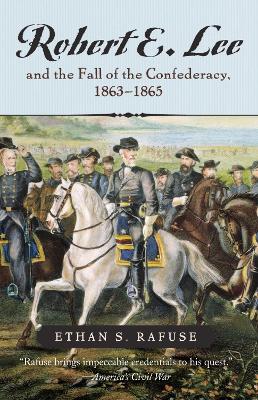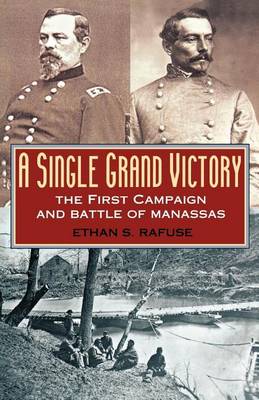The American Crisis Series: Books on the Civil War Era
2 total works
Robert E. Lee and The Fall of the Confederacy, 1863-1865
by Ethan S. Rafuse
Published 1 January 2008
The generalship of Robert E. Lee, the Confederacy's greatest commander, has long fascinated students of the American Civil War. In assessing Lee and his military career, historians have faced the great challenge of explaining how a man who achieved extraordinary battlefield success in 1862-1863 ended up surrendering his army and accepting the defeat of his cause in 1865. How, in just under two years, could Lee, the Army of Northern Virginia, and the Confederacy have gone from soaring triumph at Chancellorsville to total defeat at Appomattox Court House?
In this reexamination of the last two years of Lee's storied military career, Ethan S. Rafuse offers a clear, informative, and insightful account of Lee's ultimately unsuccessful struggle to defend the Confederacy against a relentless and determined foe. Robert E. Lee and the Fall of the Confederacy describes the great campaigns that shaped the course of this crucial period in American history, the challenges Lee faced in each battle, and the dramatic events that determined the war's outcome.
In addition to providing readable and richly detailed narratives of such campaigns as Gettysburg, Bristoe Station, Spotsylvania, and Appomattox, Rafuse offers compelling analysis of Lee's performance as a commander and of the strategic and operational contexts that influenced the course of the war. He superbly describes and explains the factors that shaped Union and Confederate strategy, how both sides approached the war in Virginia from an operational standpoint, differences in the two sides' respective military capabilities, and how these forces shaped the course and outcome of events on the battlefield.
Rich in insights and analysis, this book provides a full, balanced, and cogent account of how even the best efforts of one of history's great commanders could not prevent the total defeat of his army and its cause. It will appeal to anyone with an interest in the career of Robert E. Lee and the military history of the Civil War.
In this reexamination of the last two years of Lee's storied military career, Ethan S. Rafuse offers a clear, informative, and insightful account of Lee's ultimately unsuccessful struggle to defend the Confederacy against a relentless and determined foe. Robert E. Lee and the Fall of the Confederacy describes the great campaigns that shaped the course of this crucial period in American history, the challenges Lee faced in each battle, and the dramatic events that determined the war's outcome.
In addition to providing readable and richly detailed narratives of such campaigns as Gettysburg, Bristoe Station, Spotsylvania, and Appomattox, Rafuse offers compelling analysis of Lee's performance as a commander and of the strategic and operational contexts that influenced the course of the war. He superbly describes and explains the factors that shaped Union and Confederate strategy, how both sides approached the war in Virginia from an operational standpoint, differences in the two sides' respective military capabilities, and how these forces shaped the course and outcome of events on the battlefield.
Rich in insights and analysis, this book provides a full, balanced, and cogent account of how even the best efforts of one of history's great commanders could not prevent the total defeat of his army and its cause. It will appeal to anyone with an interest in the career of Robert E. Lee and the military history of the Civil War.
More than 800 men lost their lives and 2,700 were wounded. Confederate General Thomas J. Jackson earned his legendary nickname "Stonewall" here as fellow Confederate General Barnard Bee, later fatally wounded in the battle, shouted, "Yonder stands Jackson like a stone wall!" Both the North and the South believed that a single victory in this first major battle would decide the war before it barely started. Yet the first battle of Manassas, or Bull Run, has not received nearly the same attention as the other major clashes of the Civil War. A Single Grand Victory is a highly readable, concise, comprehensive narrative by Ethan S. Rafuse, professor of history at the United States Military Academy at West Point. Rafuse worked as a park ranger at Bull Run, where he gained great familiarity with the site and the literature on this battle. His new book incorporates insights offered in recent scholarship on Civil War military, political, and cultural history. The author describes the factors that led President Abraham Lincoln to order an offensive against Confederates at Manassas Junction at a time when his most prominent military men advised against it. The war policies of both the Union and Confederate sides are explained. Rafuse offers descriptions and analysis of the individuals involved and the circumstances that influenced the manner in which the campaign was conducted. He covers the critical events and operational and tactical decisions that shaped the campaign's course and outcome. In addition, A Single Grand Victory provides insights into American life in the nineteenth century by examining what motivated men to fight in 1861 and describing what led both North and South to expect the war would be a short one. Southerners had anticipated that one victory like Bull Run would persuade the North to abandon the effort to restore the Union by force. Northerners believed support for the Confederate rebellion was so shallow that one battle would end the war. Civil War buffs will enjoy this

